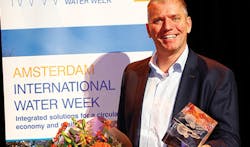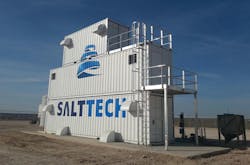Dutch ZLD technology is one to watch
As industrial water users face increased pressure to reduce freshwater consumption and improve the quality of their effluent, zero liquid discharge technology from Dutch company Salttech is poised to be an important tool in their arsenal.
The company’s Dynamic Vapor Recompression (DyVaR) water processing system uses evaporative and cyclonic technologies to separate out salts and other components, recovering almost all of the clean water - up to 97 percent - from any high chloride water containing dissolved salts and other contaminants. The remaining 3 percent is discharged in the form of solid salts and minerals.
DyVaR applications include produced water treatment in hydraulic fracturing, oil sands processing, and oil and natural gas production. But it’s also suitable for seawater desalination.
According to Salttech, a standard DyVaR system can handle any salt concentration and can produce any brine concentration, depending on local requirements or user specifications. And, because they use cyclones and polymer materials, DyVaR systems are insensitive to scaling and fouling even when salt concentrations widely fluctuate.
At the recent Aquatech Amsterdam tradeshow that took place in early November, Salttech generated considerable buzz when it took top honors in the Innovation Awards program - not only in the wastewater treatment category but as the overall winner of the competition.
“I am very excited about the winner,” said Award jury chair Dr. Cees Buisman. “They solved the problem for any combination of salts, which for many other technologies is not possible.”
“We’ve designed a completely new technology to treat high-saline, complicated waters and to separate the pollutants from the water,” explained Salttech CEO Gerard Schouten. The result is a dry salt and very clean water. “Zero liquid discharge and enabling water to be reused 100 percent,” he said. “That’s basically what our technology is about.”
The DyVaR technology is currently being used at a site in Texas - its first full-scale installation. Schouten said the installation, which has been operating for about a year now, is performing well and processing wastewater that was once considered to be untreatable.


